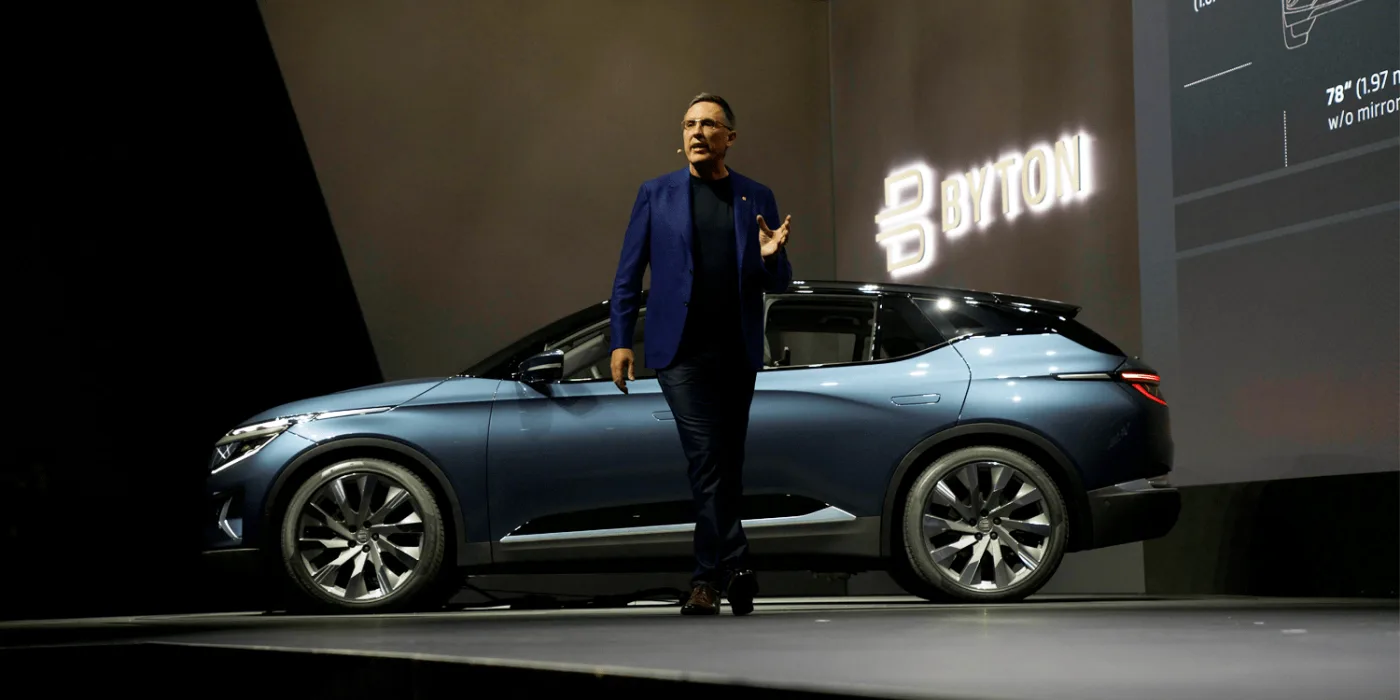Byton wins fresh financing in round 3
Byton electric car startup has received round C financing with the stake purchased by Japanese conglomerate Marubeni. At the CES in Las Vegas, both companies announced a strategic partnership but gave few details about the partnership. Byton also announced other partnerships, such as for content on the big screen in the M-byte.
Byton has not provided financial details of investments in the financing round. Although according to the official wording, “opportunities for further cooperation in a range of fields such as mobility services, energy solutions and overseas production and distribution” are being explored, Byton CEO Daniel Kirchert is already outlining his vision for the collaboration.
“As a world-leading conglomerate, Marubeni Corporation has significant experience and resources in a variety of fields such as renewable energy and automobile sales,” Kirchert said. “We will jointly explore the international market and provide users with future-oriented smart electric vehicles and mobility services.”
Hajime Kawamura, CEO of the Machinery, Infrastructure & Financial Business Group at Marubeni, described the investment in Byton “against the background of the current enormous change in the automotive industry” as “an essential part of our strategies in the automotive business”. “We are very much looking forward to creating a new world of mobility with Byton’s state-of-the-art technologies,” said Kawamura.
Marubeni was founded as a trading company as early as 1858, and the conglomerate has existed in its current form since 1949. The Tokyo-based company is organized into five groups through which it offers a wide range of products and services – from forestry products and agriculture to food, as well as the areas of interest for cooperation with Byton, such as chemicals, energy, metals and mineral resources, automotive and industrial machinery, and finance and leasing.
Marubeni is the second non-Chinese investor for Byton. In September 2019, the automaker entered into a cooperation with the South Korean car parts manufacturer Myoung Shin Co. The FAW Group and the industrial investment fund of the Nanjing city government also participated in financing round C. Here too, financial details of the investments have not been released. This will be the third time FAW have participated in funding rounds, the last of which was reported in May last year. In October the year before, Byton took over the FAW subsidiary Huali (Tijian) Automobile and thereby secured a production license for serial production of electric cars in China. In return, Byton took over Huali’s debt.
In a few weeks’ time, Byton plans to start serial production of the M-Byte and deliver it to the Chinese market in 2020, followed by the market launch in North America and Europe in 2021. At the CES, Kirchert said that 60,000 pre-orders for the M-byte have now been placed. In addition, there are already agreements for Europe with some car dealership groups that already sell premium vehicles from other manufacturers. This is exactly where Byton wants to start with the M-Byte, at prices starting at around 45,000 dollars or euros before tax.
The M-Byte is supposed to be like a “smartphone on wheels”, as the manufacturer repeatedly emphasises. Exactly what the company means by this has become a little clearer since Byton presented not only its partnership with Marubeni at the CES but also a number of content partners who are to provide digital content for the 48-inch display in the car.
“Like any great smart device, it is not just what it can do but what you do with it,” says Andreas Schaaf, CCO at Byton. The newly merged media companies ViacomCBS and ACCESS, for example, are expected to deliver video content that will provide a “rich video experience”, as Byton promises. “The future of in-vehicle infotainment is an exciting opportunity to strengthen and extend our connection to our audiences within today’s fragmented media environment,” said Ray Hopkins, president of U.S. Networks Distribution, ViacomCBS.
Open platform for developers
In addition to the video platform (for charging breaks or passengers during the journey), Byton users will also have access to “hyperlocal” weather forecasts through a cooperation with AccuWeather. With this information about the current weather and conditions at the destination, the driver should be able to better plan the further journey ahead, as Jeff Chung, VP Digital Engineering at Byton explains.
Another collaboration with Aiqudo will enable voice control of apps on smartphones without distracting the driver. According to the developer, Aiqudos’ engine finds out which app the user wants to call with their actions.
In addition to this and other collaborations, Byton also announced a developer platform that will enable developers to program applications for the user interface in Byton models. With this opening, the manufacturer intends to “exploit the full potential of the groundbreaking user interface”. “We believe that Byton’s unique user interface provides developers with both a challenge and an opportunity to present content that they would not find in any other in-car environment,” said Chung.
Byton also plans to sell stationary battery storage. The batteries will be produced in Nanjing, but there are no further details about the new product yet. “We have the technology and manufacturing capacity to assemble batteries into safe, efficient and cost competitive packs. We view this as a major business opportunity with the start of sales of the M-Byte,” says Daniel Kirchert.
byton.com, byton.com (digital content), venturebeat.com (M-Byte)


0 Comments